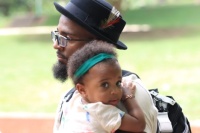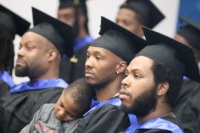Betsy Helgager Hughes, BLH Consulting, Inc. for Fathers Incorporated and the Moynihan Institute for Fatherhood Research and Policy
404-771-9793 mobile; betsy@blhconsulting.net
Study underscores the value and impact of generational fatherhood on children, and their interest of moving beyond the provider role to the nurturer.
(Black PR Wire) ATLANTA – During the State of Black Fathers in Fulton Forum on Feb. 20 in Atlanta at Pittsburgh Yards, Fathers Incorporated (FI) and the Moynihan Institute for Fatherhood Research and Policy, two preeminent organizations created to support Black fathers and fatherhood, revealed key findings from their latest research report, "The Dynamics of Atlanta Black Dads: Unpacking the Myths and Realities of Non-Resident Fatherhood in Fulton County, Georgia. Although the research focuses on one major county in Georgia, many of the challenges are universal. The report offers a deep dive into the local challenges and strengths of Black fatherhood. The study, which was comprised of one-on-one interviews and focus groups, reveals fathers often feel unsupported by community services that traditionally cater to mothers and children, encounter co-parenting challenges and have fewer fathering role model, impacting their parental self-efficacy.
"Our study illuminates the need for support for fathers who are motivated to play an impactful role in their children’s lives, along with helping them navigate their rights, co-parenting and best practices to help them succeed," said Kenneth Braswell, founder and CEO, Fathers Incorporated and the Moynihan Institute for Fatherhood Research and Policy. "The insights stress the importance of engaging fathers through community events and providing meaningful services for them can actually leverage this moment of increasingly heightened paternal awareness. By doing so, as a society, we'll be able to forge a more supportive environment for fathers, enabling them to be the effective and influential parents they aspire to be."
The report highlights the misperception that the non-resident father is disinterested in his child or children, and the supports he needs and wants to be the type of father he desires to be. It exposes their challenges and their triumphs. It explores the systemic gaps in support from the viewpoint of the non-resident father (a father not living in the home with his child), amplifying his voice so he can be heard and not ignored or invisible.
"We often don't think about that father that wants to be there and be involved, but for whatever circumstances can't be," said Dr. Jeffrey Shears, researcher, co-chair, Moynihan Institute for Fatherhood Research and Policy and co-author of the report. "We explored the experiences and dynamics of the single father who may not have had a father and now has a child and is a non-residential father, but desperately wants to be involved with his child, but for whatever reason just isn't or can't be in the home."
Another co-author of the report, Dr. Matisa Wilbon, researcher, co-chair, Moynihan Institute for Fatherhood Research and Policy stresses how society has not historically supported fathers, Black fathers in particular. "When you say Black dads, there are so many stereotypes that come up, and society already likes to suggest that Black dads aren't present, and that it's the Black mom that's doing everything. Just because someone isn't physically present doesn't mean they don't want to be a good father. Not only do we need to stop denigrating and narrowly defining the Black father by assuming his inadequacies are inherent, but he also needs to be given the same level of support and help mothers are provided."
Additionally, there are things occurring in our society today that are elevating and exposing where the lack of services become an issue for Black dads, and that's Black maternal mortality. According to the Centers for Disease Control, Black women have the highest morality rate in the United States - 69.9 per 100,000 live births in 2021, almost three times the rate for white women.
"The conversation we're not having is that many dads are ending up as single dads because of systemic health inequity issues, and the fathers are not being afforded the equal services the mother would receive if something unfortunately would happen to the father," said Braswell. "A lot of these services are not friendly to dads in this space, even under these circumstances. Bottom-line, we need to listen to fathers more and help them feel supported and become the dads they want to be in addition to improving overall co-parenting skills."
To download the full report, go to https://themoynihaninstitute.com. To listen to the I AM DAD. podcast about this report on YouTube, go here.
# # #
ABOUT FATHERS INCORPORATED
Established in 2004, Fathers Incorporated (FI) has a unique seat at the national table, working with leaders in the White House, Congress, U.S. Department of Health & Human Services, Family Law, Business, Faith-Based and the Responsible Fatherhood Movement. Fathers Incorporated works to change the current societal and cultural definition of family to be inclusive of fathers. FI works collaboratively with organizations around the country to identify and advocate for social and legislative changes that lead to healthy father involvement with children, regardless of the father’s marital or economic status, or geographic location. The organization's focuses on several issues, ranging from coparenting, employment, incarceration, domestic violence, child support, financial stability, fatherhood engagement and early childhood development. To donate or to learn more, visit fathersincorporated.com.
ABOUT MOYNIHAN INSTITUTE FOR FATHERHOOD RESEARCH AND POLICY
The Moynihan Institute for Research and Policy provides descriptive and explanatory research and policy positions on issues that impact Black families from the perspective of fathers. To donate or to learn more, visit the Moynihan Institute of for Fatherhood Research and Policy.
MEDIA CONTACT:
Betsy Helgager Hughes, BLH Consulting, Inc. for Fathers Incorporated and the Moynihan Institute for Fatherhood Research and Policy
404-771-9793 mobile; betsy@blhconsulting.net




